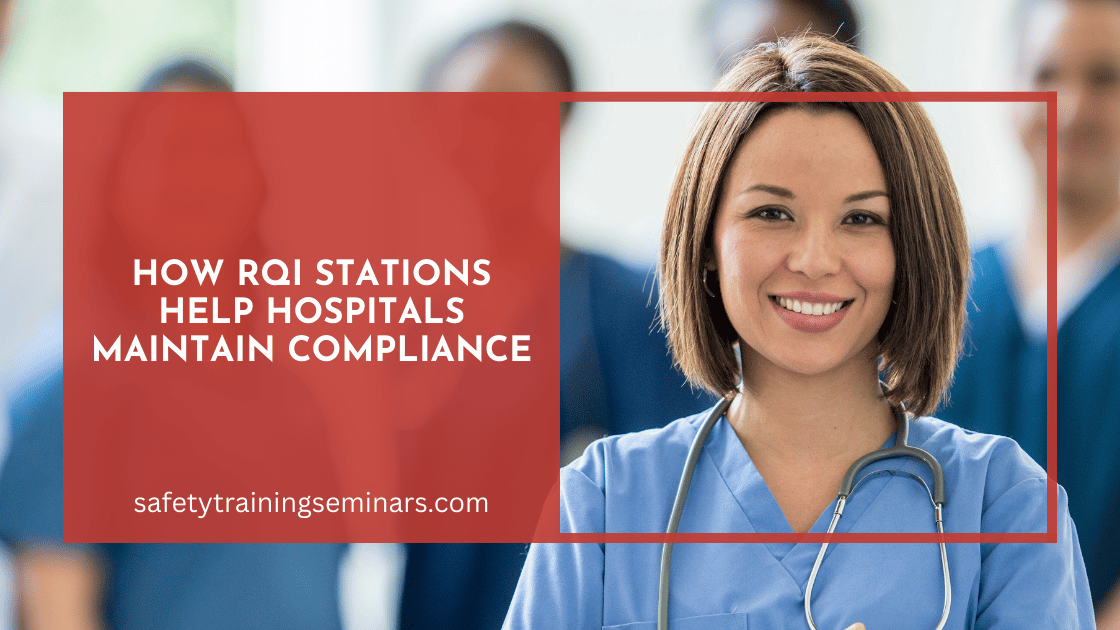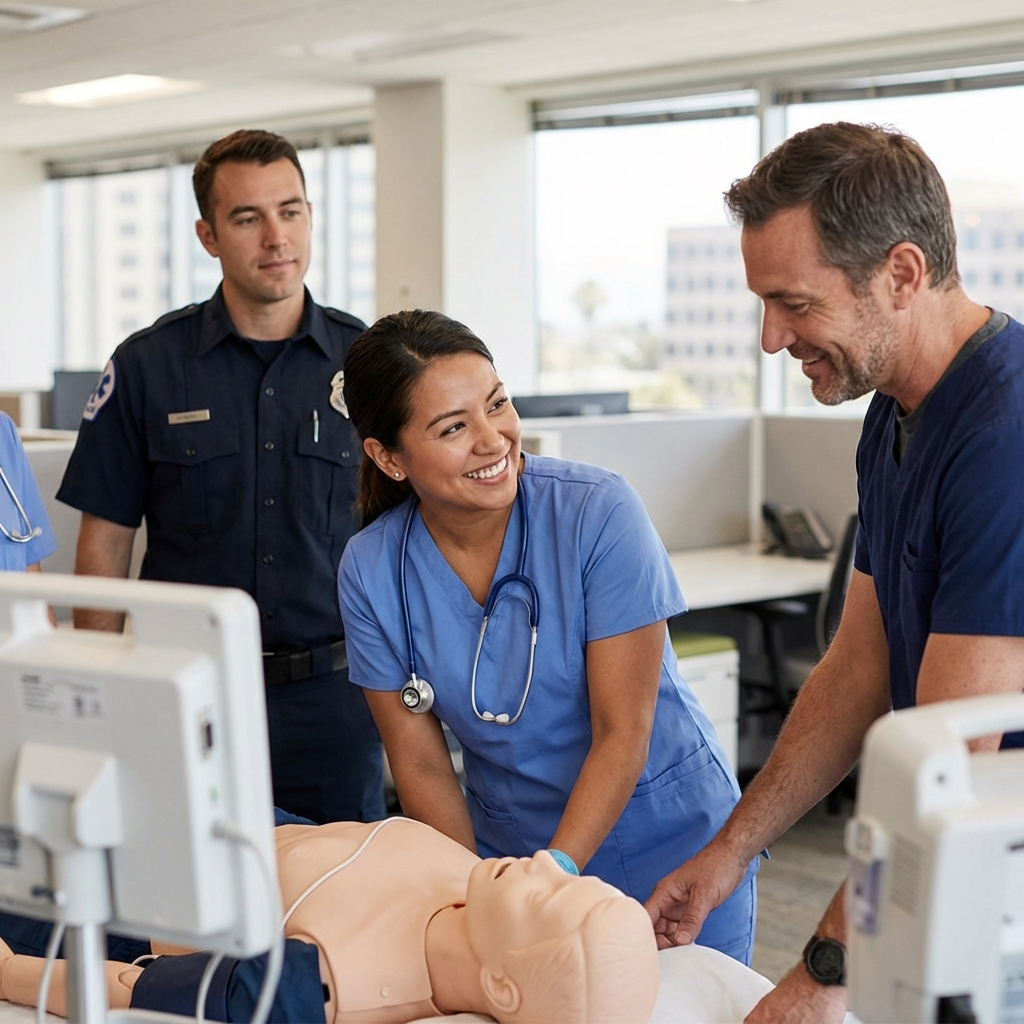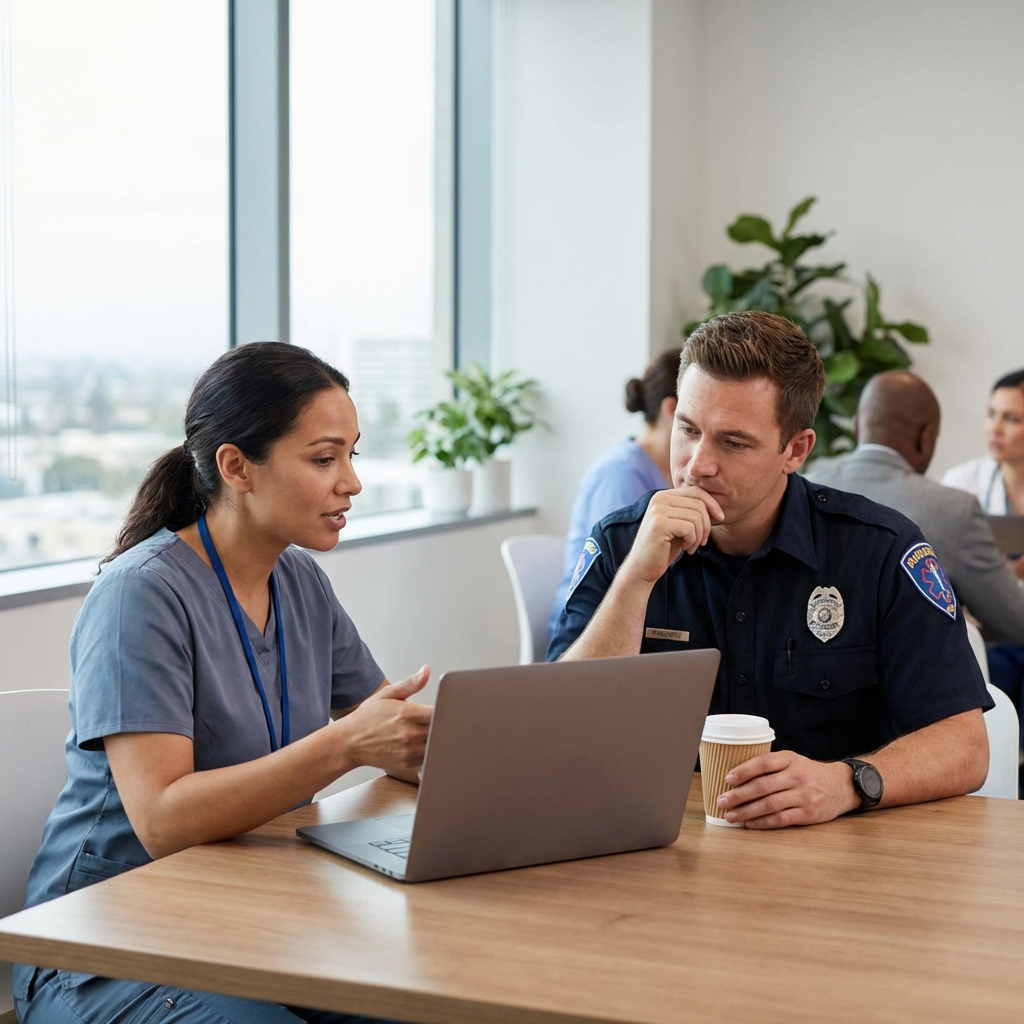Healthcare compliance isn’t just paperwork—it’s about patient safety. When your hospital staff maintains current certifications in BLS, ACLS, and PALS, they’re prepared to respond effectively during critical moments. That’s where RQI stations make all the difference.
At Safety Training Seminars, we’ve seen firsthand how RQI (Resuscitation Quality Improvement) stations transform hospital training programs. These innovative systems don’t just streamline certification processes—they help hospitals avoid compliance pitfalls while ensuring staff members receive the highest quality training.
The challenge many hospitals face is maintaining consistent, compliant training across all departments. Traditional training methods often create scheduling conflicts, require expensive external contractors, and leave gaps in coverage. RQI stations solve these problems by putting control back in your hands.
What Makes RQI Stations Essential for Hospital Compliance
RQI stations represent a breakthrough in medical training technology. These Voice-Assisted Manikin (VAM) systems combine American Heart Association’s online coursework with hands-on skills assessment, creating a comprehensive training experience that meets all AHA compliance standards.
Unlike traditional classroom training, RQI stations operate 24/7. Your nursing staff can complete their BLS renewal during night shifts. Residents can practice ACLS skills between rotations. Emergency department teams can refresh PALS techniques when patient volume is low.
The system works through three simple steps. First, healthcare professionals complete the required AHA online course at their convenience. Next, they perform skills testing on the VAM, which provides real-time feedback on compression depth, rate, and technique. Finally, they receive their official American Heart Association certification card immediately upon successful completion.
Avoiding the Compliance Nightmare of Fraudulent Training
Hospital administrators face a growing threat: fraudulent CPR training companies. These unscrupulous providers offer non-compliant courses at suspiciously low prices, putting your entire organization at risk.
When the American Heart Association discovers these fraudulent operations, they can revoke certification cards—sometimes going back six months or more. Can you imagine the chaos of discovering that hundreds of your staff members need retraining? The cost isn’t just financial. It’s operational disruption, regulatory scrutiny, and potential patient safety risks.
We’ve witnessed hospitals scramble to retrain entire departments after discovering their previous training was non-compliant. The financial impact includes not only new training costs but also overtime pay while staff complete emergency recertification. Some facilities have faced regulatory penalties and delayed accreditation reviews.
RQI stations eliminate this risk entirely. Every certification comes directly from an official AHA Training Center, ensuring complete compliance with all regulatory standards.
Cost Control and Operational Efficiency
Traditional hospital training programs often rely on expensive external contractors. These arrangements create several problems: inflexible scheduling, high per-person costs, and dependence on outside vendors for critical compliance requirements.
RQI stations flip this model. Instead of paying contractors repeatedly, hospitals make a single investment that serves their training needs for years. The minimum commitment of 50 BLS licenses per month might seem significant, but most hospitals easily exceed this threshold across all departments.
Consider the math. External training companies typically charge premium rates for on-site services. They require minimum class sizes, specific scheduling windows, and often cancel sessions if enrollment is low. RQI stations operate whenever your staff needs them, without scheduling constraints or minimum participation requirements.
The two-year agreement structure provides predictable training costs while eliminating the uncertainty of contractor pricing changes. You’ll know exactly what your compliance training will cost, making budget planning much simpler.
24/7 Training Availability Transforms Staff Scheduling
Hospitals never sleep, and neither should your training program. RQI stations operate around the clock, allowing staff to complete certifications when it’s most convenient for their schedules and your operations.
Night shift nurses can complete BLS renewals during quiet periods. Day shift staff can refresh skills without leaving during busy hours. New hires can complete orientation training immediately upon arrival, rather than waiting for the next scheduled class.
This flexibility reduces staffing disruptions and eliminates the common problem of expired certifications. When staff can easily maintain current credentials, your hospital avoids the operational headaches of last-minute training scrambles.
Emergency departments particularly benefit from this accessibility. During surge periods, when every qualified staff member is essential, RQI stations ensure training never becomes a bottleneck.
Quality Assurance Through Standardized Training
RQI stations deliver consistent training quality across all sessions. Unlike instructor-led classes, where teaching quality can vary, VAM technology ensures every participant receives identical instruction and assessment.
The system provides objective feedback on performance metrics like compression depth, rate, and hand placement. This data-driven approach eliminates subjective assessments while ensuring participants meet exact AHA standards before certification.
For hospital quality assurance programs, this consistency is invaluable. You can document that every staff member received identical training and met the same performance benchmarks. This standardization supports Joint Commission requirements and helps during regulatory inspections.
Comprehensive Support Makes Implementation Simple
We don’t just deliver RQI stations and walk away. Our comprehensive support program ensures your hospital’s training initiative succeeds from day one.
Our team provides complete equipment training for designated staff members. We’ll guide you through setup procedures, teach system operation, and ensure your team feels confident managing the program independently.
Customer support operates seven days a week from 7 AM to 7 PM Pacific time. Whether you need technical assistance, training guidance, or program optimization advice, our experienced team is available to help.
This support extends throughout your entire agreement period. As your training needs evolve, we’ll work with you to optimize the program and ensure maximum value from your investment.
Getting Started with RQI Stations
The process begins with a simple conversation about your hospital’s specific needs. We’ll assess your current training volume, identify potential challenges, and design a program that fits your operational requirements.
Our training agreement requires a minimum of 50 BLS licenses monthly and a two-year commitment. This structure ensures the program remains cost-effective while providing the stability needed for long-term planning.
Most hospitals find they easily exceed the minimum license requirement across all departments. Emergency medicine, intensive care, surgical services, and general nursing units all require regular certification maintenance.
Contact Karl Ico at 415-640-1618 or karl@safetytrainingseminars.com to discuss your hospital’s specific requirements. He’ll walk you through the application process and provide detailed pricing information based on your projected usage.
Transform Your Hospital’s Training Program
RQI stations represent more than just training equipment—they’re a strategic investment in patient safety, staff satisfaction, and operational efficiency. By bringing certification control in-house, your hospital gains flexibility, ensures compliance, and reduces long-term costs.
The technology eliminates scheduling conflicts, prevents compliance violations, and provides the 24/7 accessibility your staff needs. Most importantly, it ensures your healthcare professionals maintain the life-saving skills that make the difference when seconds count.
Don’t let your hospital remain dependent on external contractors for critical compliance training. Take control of your certification program with RQI stations from Safety Training Seminars. Your staff will appreciate the convenience, your administrators will love the cost savings, and your patients will benefit from the consistently high-quality care that comes from properly trained healthcare professionals.









